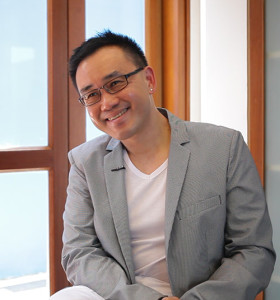At 24, Robin Loon already had a clearer vision for his life than most in their twenties. Eschewing a career in medicine as his parents had envisioned, Loon, then an English Literature and History major at the National University of Singapore (NUS), was certain of a life in theatre.
…what would make [Loon] really happy are: “One, to do absolutely nothing, if I can afford such a lifestyle. Two, to be involved in theatre. Three, to travel. If I can’t do any one of them, I think I’ll teach. “Teaching would give me a chance to promote theatre in the schools, which is where we have to start, to cultivate an interest in theatre in Singapore.”Source: Serious Loon by Ricky Yeo. In The Straits Times (8 April 1992).
Loon’s flair for playwriting became evident in his undergraduate years. His first play, Solitaire, written in 1988, won the Shell Playwriting Competition and was staged at the university a few years later.
Loon then joined TheatreWork’s fruitful playwright incubation programme Writers’ Laboratory. At the Writers’ Lab, Loon was schooled alongside some of today’s most illustrious local playwrights, such as Eleanor Wong, Desmond Sim, Ovidia Yu, and Tan Tarn How.
One major work to emerge from the Writers’ Lab was Absence Makes the Heart Grow Fonder, a heart-rending drama about aging and filial piety. Absence premiered in 1992 and won praise from peers, audience members, and even Straits Times theatre critic Hannah Pandian.
It was during the opening night of Robin Loon’s Absence Makes The Heart Grow Fonder, and it was in the middle of the play that [an audience member] began to alternately sniffle and blow, rather too loudly, into a handkerchief.
And as the final act reached its climax, his weeping also attained a corresponding crescendo.
The rest of the audience did not seem to mind, for no one said so much as a “shh, shh”. They probably had their own tissues out. At one point I had trouble myself quelling the tears threatening to well up in my eyes.Source: It needn't be 'experimental' by Tan Tarn How. In The Straits Times (13 April 1992).
Naturalistic drama, while always guaranteeing a mainstream audience, is often in danger of settling into oversimplification, because of its lack of challenges in form. But perhaps, it is also Loon’s age (24 years) that has afforded him this two-dimensional view of human nature. Having said that, it is also surprising that Loon, with so little experience behind him, has mastered details of dramatic technique that 50-year-old playwrights in Singapore still have not. He hits on rare, genius moments of stage tension.Source: A Bill Cosby perspective by Hannah Pandian. In The Straits Times (10 April 1992).
Loon’s fascination with history surfaced in his subsequent works. For example, Watching the Clouds Go By (1994) is a romance set in the throes of the Cultural Revolution. Broken Birds: An Epic Longing (1995), which he co-wrote with Ong Keng Sen, tackled pre-war Japanese prostitution in Singapore.
I am constantly amazed at how fragile our reality is – how it disintegrates as we uncover events in our past that were hitherto hidden from us. This is my greatest realisation in Broken Birds. But the task now is not to lament the atrocities of history but to rebuild ourselves with this knowledge of the past. Being a student of literature and history, I found great satisfaction in merging the two seemingly disparate disciplines into one form – fact and fiction fusing in theatre.Source: Robin Loon's message, programme booklet from the 1995 production of Broken Birds (TheatreWorks), http://theatreworks.org.sg/archive/broken_birds/index.htm
More recently in 2012, Loon renewed his interest with memory and historical narratives in Casting Back, a collaboration with theatre veterans Nora Samosir and Christina Sergeant which traces the history of Singapore theatre through the recollections of the two actresses. Casey Lim directed Casting Back, which was commissioned for the Esplanade’s 10th anniversary celebrations.
Casting Back feels like a performance tailored to fit the theatre in-crowd a little better, with its inside jokes about working with certain theatre practitioners.
“I guess you never forget a fight with OKS,” Samosir says in jest to knowing laughter from the audience, using the abbreviation for TheatreWorks’ Ong Keng Sen. The actresses also chafe at being called “veteran actresses”, cringing at the shorthand for actresses who have, well, been acting for a very long time.
But there are scenes that do work, especially when Sergeant and Samosir recall some genuinely heartfelt moments of their encounters in the theatre, whether it is when shaping some of their more or less memorable characters, admitting their “glorious failures” or describing the intimate times spent in the rehearsal rooms of the old Drama Centre at Fort Canning.Source: Actresses remember fights, critiques and venues by Corrie Tan. In The Straits Times (15 October 2012).
Loon is also effectively bilingual in English and Mandarin, and aspires to translate works between the two languages. He realised this ambition with Chay Yew’s A Language of Their Own, about the relationship between two Chinese-American gay men. For Loon, he saw an opportunity to up the ante on the play’s explorations of race and culture through language.
Loon translated A Language of Their Own into Chinese, deliberately retaining the setting and pop culture references of the original even though they were discordant in the translated work. Once again teamed up with Casey Lim (who also directed the 2006 staging by Checkpoint Theatre) the pair brought the re-titled 《男男自语》 to the stage at the 2012 Singapore Arts Festival.
This play just isn’t an obvious choice for translation. But if a production is judged by its effect on its audience, no matter its provenance, Loon’s version was a smash hit.It made people laugh and cry. It was playful and lyrical, romantic and utterly devastating. It provided the sort of night one dreams of having in the theatre: a sense that the complications of the world, all its beauty and tragedy, have been illuminated and done justice to, if only for two hours.Source: Elegy in a new language by Adeline Chia. In The Straits Times (21 May 2012).
At the end of the day, my assessment is that this is a fine interpretation of A Language of Their Own. It’s definitely worthy of restaging, given that its initial run was a near-sold-out weekend of five shows, including two matinees. It’s also proof that Robin Loon’s translation works – this script should be performed in other countries, even if the production itself doesn’t travel. Congratulations to all, including the absent playwright. Chay, you’ve got to fly in to see this.Second language by Ng Yi-Sheng. In The Flying Inkpot (20 May 2012), http://tinyurl.com/o76af8j
While Loon these days has been described as a “practicising playwright”, he has not confined himself to the role of a scribe. He has also served as a dramaturg in productions, festivals and arts programmes. (And at Centre 42 as its Founding Board Member and Chief Consultant as well!)
To date, he has also dabbled in a variety of roles in theatre, which include being an actor, director, production assistant, stage manager, festival director, and designer. Loon was also the gamemaster of TheatreWork’s annual 24-hour Playwriting Challenge for several consecutive years, and returned to head the Writer’s Lab in 2006.
In the meantime, Loon pursued postgraduate studies, eventually receiving a PhD in Intercultural Theatre and Performance from Royal Holloway, University of London in 2004. And, as he declared back in 1992, Loon currently teaches Theatre Studies as a senior lecturer at NUS.
^Back to top

Robin Loon. Credit: 50 Years of Theatre Memories
Selected Plays
2015 – 汐
2014 – Nineteen Sixty-Four (collaborator)
2013 – LIFT: Love Is Flower The
2012 – Casting Back
2012 – 男男自语
2011 – Mata Hati
2011 – DNR
1997 – Destinies of Flower in the Mirror
1995 – Broken Birds: An Epic Longing (co-written)
1994 – Watching the Clouds Go By
(Text available in the Book Den)
1992 – Absence Makes the Heart Grow Fonder
Additional Sources:
Faculty of Arts and Social Sciences, Faculty Profile [Webpage]
By Daniel Teo
Published on 18 November 2015
The Vault: 汐/Sea revisits Haresh Sharma’s Sea and refreshes it with a Chinese translation and memories of the 1997 production. Performed by Serene Chen and Zelda Tatiana Ng, in collaboration with Robin Loon and Casey Lim, on 23 November 2015, 8pm at Centre 42 Black Box. Admission is free. Find out more here.






